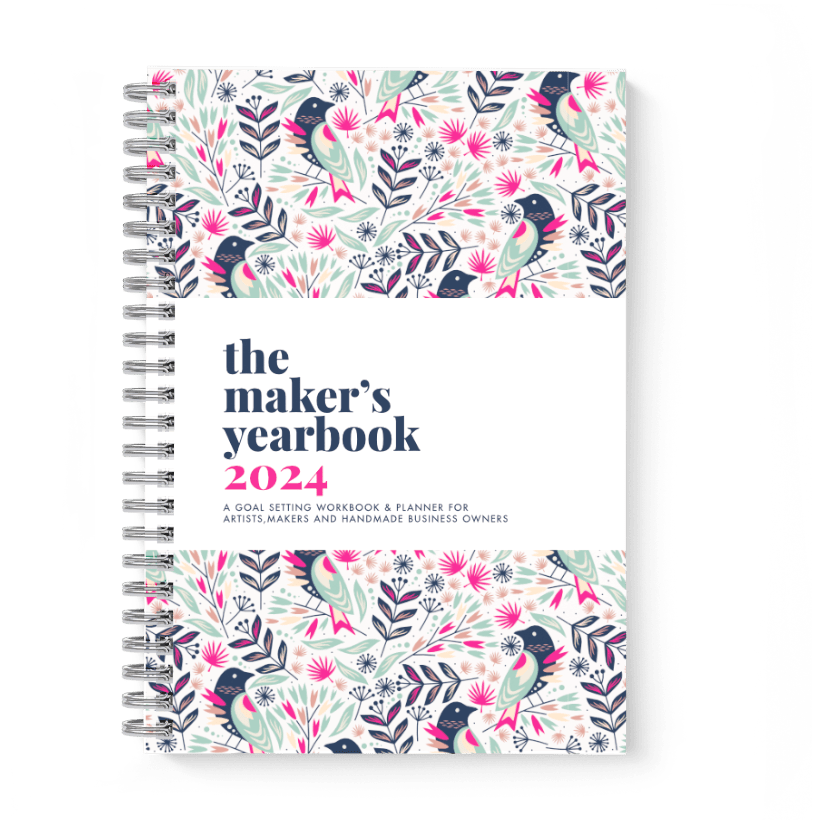Makers often spend a lot of time worrying about how we are perceived by other people. Our customers, our suppliers, our stockists and even passers-by.
Many of us start out without any kind of business training, working on the kitchen table, on the living room floor, in a spare bedroom or while the kids are napping.
A hefty dose of imposter syndrome can make us ashamed of our smallness, and we carry that feeling of not-good-enoughness around with us.
It permeates into our interactions with shops, galleries, journalists, customers and it can keep us from really stepping up as business owners and putting ourselves forwards for opportun
But being professional is all about the standards that you set for yourself and your business, and these have nothing to do with being big or experienced.
They have nothing to do with having employees, or a fancy studio. They have nothing to do with how many mistakes you make. And they have nothing to do with how much money you make.
Looking like more of a big deal than you are is not what it is about.

The standards and the values that you set for your business and the way you express those values in everything you do is what makes you look professional.
Most of the time it simply comes down to consistency and communication.
So let’s dive in to some real world examples.
1️⃣ Do what you said you were going to do. Always.
In any business relationship, the most important thing is that people know what to expect, so you have to deliver on what you said you were going to do.
And if circumstances change and you can’t deliver, you need to let people know in a timely manner.
Of course, it never hurts to leave room for the unexpected. All businesses have unexpected problems from time to time which can lead to delays. Suppliers let you down or go bust, your parcels get lost in the post, a family member becomes ill, your workshop gets flooded.
Be honest and upfront about what has happened and tell them how you are going to make it right. And don’t promise anything you aren’t sure you can deliver.
2️⃣ Communicate Promptly and Consistently
Whether it’s the people who order on your website, your wholesale customers, or a magazine you promised to write an article for, keep people informed about what they can expect from you, and when.
Most people who order from you are happy to wait for their order, as long as they know how long they’ll have to wait. So tell them. Put it in your confirmation email. Put it in your product descriptions. Respond to all customer emails in a timely fashion.
That doesn’t necessarily mean that you need to be constantly in your inbox but it does probably mean that you should respond within 24 hours.
If you’re not able to, or you’re going to be away for a few days, then use an out of office autoresponder so that your customers know when to expect a response from you.
3️⃣ Dispatch orders in a consistent way.
Generally, you want your customers to have the same experience, no matter when they order from you.
So you would want to package their order in the same way each time. If you normally send items wrapped then you wouldn’t suddenly stop doing this or sometimes do it and sometimes not.
You would also want to make sure that your orders are shipped out on a consistent schedule. So, if you sometimes get your orders shipped out within a day, you wouldn’t want to suddenly start shipping them out once every two weeks, without letting the customers know that it will be longer than usual before they receive their order.
4️⃣ Consider your customer’s needs.
Seeing things from your customer’s perspective and considering what you would want in their position is a really valuable skill that can make you look extremely professional.
Although this is important for ALL customers, it can be particularly helpful when building wholesale and SOR relationships.
Considering that your SOR customers need a detailed delivery note, or knowing that your wholesale customers might need some posters or strut cards for their display shows them that you have thought about their needs and how to help them out.
This changes the dynamic of the relationship to a partnership, rather than a hierarchy where they are the customer and you have to do anything and everything to convince them to give you a try.
Sometimes a key factor for trade customers is how much hassle you are going to be to deal with, especially if your product isn’t unique or isn’t a super fast seller.
Building a partnership with your trade customers and helping them to make a success of selling your products to their end customers, shows them that you understand business relationships and that you’re going to be easy to work with.
5️⃣ Contact people in a respectful way.
A lot of makers get all tied up in knots about contacting shops and galleries or showing their work to journalists and this is one place where it’s easy to end up unintentionally looking unprofessional.
Unprofessional communication is entitled. It’s all about what you want from them. You want your work in their shop or you want to be featured and you are contacting them to ask for that.
It’s not your intention to be unprofessional but you treat them as if they are a nameless “dear shopkeeper” or you forget that following up with a “did you get my email” makes people feel defensive and annoyed.
Professional communication is all about the win-win. What’s in it for them? What do they get out of this relationship?
Again, this is about having the confidence to know what your products offer the end customer and showing the retailer that you have thought about how and why your products are a great fit for their shop.
It’s about understanding that providing journalists with products to show in their gift guide features is useful to them, as long as you’ve bothered to do your homework. And it’s also about understanding that following up is helpful when it’s done right.
When you respect people’s time, you treat them like a real live human being, and you show them your desire to build a partnership, your communication really stands out in a sea of unprofessional pitch emails.
So how can you ensure you bring more professionalism into everything you do?
Create a set of “values” for your company.
Set out what your company stands for and how you intend to treat people. Even one person businesses can benefit from this kind of clarity around how things are done.
Once you have your values down in writing you can then use them as a yardstick to measure everything you do.
Writing some new product descriptions? Are they in line with your values? Creating your wholesale terms and conditions? Are they in line with your values?
Create targets for responding to customer emails and dispatching orders.
Setting a target for how you want to respond to customers can help you to be more reliable and therefore more professional.
If your aim is to respond within 24 hours can you set up a folder in your email account for customers that need a response and set a time once a day to go through it and get back to everyone?
Canned responses from Gmail can be a great tool for creating email templates that allow you to respond consistently to all customers. This ensures you don’t forget to add in the niceties when you’re stressed or busy, and you don’t forget to include vital information.
Setting targets and guidelines for when you dispatch orders can also help to provide a consistent experience for your customers AND keep you on track when things get busy. You could pack and ship your orders at the same time each day or separate orders that have a longer lead time or that contain out of stock products and send the customer a quick email to let them know the timeframe for their delivery.
As a bonus, if you write these guidelines down, you’ll have ready made instructions if you need to bring on anyone to help you pack and ship orders at busy times.
Create a checklist for your pitch emails.
This checklist can remind you to find the person’s name, treat them like a real person and identify the win-win, and set a calendar reminder to follow up in friendly way that emphasises the win-win.








